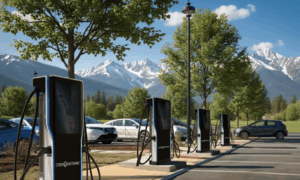
Home / EV Charging News / The Impact of Electric Cars on Public Health
Electric cars are becoming an increasingly popular choice for individuals and businesses alike, as people are recognizing the benefits of reducing emissions and improving air quality. This article will explore the impact of electric cars on public health and how they can contribute to reducing health risks associated with vehicle emissions.
As the demand for electric cars grows, there is an increasing focus on improving their technology and efficiency. Some of the recent advancements in electric vehicle technology include:
Despite the numerous benefits of electric cars, there are still several challenges to their widespread adoption. Some of these challenges include:
In conclusion, while there are challenges to the adoption of electric cars, the benefits they offer are significant and cannot be ignored. As technology continues to improve and costs decrease, electric cars will become an increasingly viable option for individuals and businesses. It is important that we continue to invest in charging infrastructure and support policies that encourage the transition to electric cars. By doing so, we can improve public health, reduce emissions, and create a more sustainable future for generations to come.



